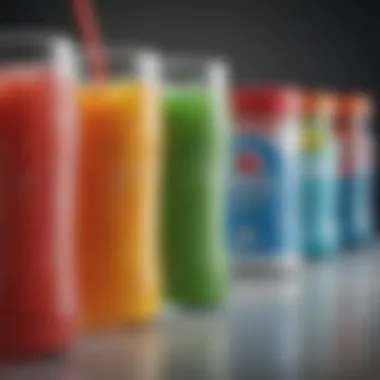Discover the Healthiest Drinks for Optimal Hydration


Intro
In today's fast-paced world, the essence of hydration often gets overlooked. Many individuals are uncertain about the best options for maintaining optimal hydration. This article seeks to clarify those uncertainties by exploring various drinks that promote health and well-being.
Hydration is crucial for numerous bodily functions, including digestion, energy regulation, and temperature control. What we drink plays a significant role in our overall health. However, not all hydration drinks provide the same benefits. Therefore, understanding which options are truly healthy is essential.
By analyzing popular hydration choices, this article aims to compare their advantages and disadvantages. Additionally, it will offer insights into how different lifestyles and preferences can influence drink selection. Readers will come away with a better understanding of hydration science and practical recommendations based on nutritional evidence.
As we delve deeper into this topic, it is important to recognize that hydration extends beyond water. Beyond just quenching thirst, the right beverages can aid in nutrient absorption and enhance recovery after physical activity. This comprehensive review will help individuals identify the healthiest options for their unique needs.
Understanding Hydration
Hydration plays a critical role in maintaining overall health and well-being. This section aims to unpack the intricate dynamics of how our bodies require water, how it functions in various physiological processes, and why understanding hydration is essential to making informed choices about what we drink.
Fluid balance is not merely a matter of drinking water when thirsty. It extends to understanding how different beverages can contribute to or detract from optimal hydration. While water is the most fundamental source, knowledge of other hydration options is vital. Recognizing these nuances can empower individuals to enhance not only their hydration status but also their overall health.
Key benefits of adequate hydration include improved cognitive function, better physical performance, and enhanced metabolic rates. On the other side, a lack of proper hydration can lead to a range of health issues, making understanding hydration pivotal for everyone, regardless of lifestyle.
The Role of Water in the Body
Water constitutes about 60% of the adult human body and serves several essential roles. It is vital for maintaining body temperature through sweating, assists in nutrient transportation, and is crucial for the proper function of organs. Water also aids in waste removal through urine and helps digest food by dissolving necessary nutrients and solids. Every cell in the body relies on water to carry out its functions.
The presence of water influences various bodily mechanisms, including:
- Temperature regulation: Water absorbs heat efficiently, which helps cool the body during intense exercise or hot weather.
- Joint lubrication: Synovial fluid, which is composed largely of water, acts as a lubricant for joints, aiding in movement and reducing wear.
- Cellular health: Proper hydration supports cell structure and function, enabling quick responses to metabolic demands.
Given its significance, prioritizing water intake is essential for sustaining health.
Signs and Symptoms of Dehydration
Being aware of dehydration is crucial, as it often goes unnoticed until the symptoms become pronounced. Symptoms can range from mild to severe, and they affect different physiological areas.
Common signs include:
- Thirst: The body's first indication that it needs more fluids.
- Dry mouth and lips: A noticeable sign of fluid deficiency.
- Fatigue: Lack of energy or feeling lethargic may indicate inadequate hydration.
- Dizziness or light-headedness: Insufficient fluid can hinder brain function, leading to balance issues.
- Decreased urine output: Dark colored urine may signal dehydration.
Moreover, chronic dehydration can lead to serious health complications, such as kidney stones or urinary tract infections. It is essential for individuals to monitor their hydration status and respond to these signals proactively.
"One of the most important aspects of hydration is that it contributes significantly to every vital process in the body."
In summary, understanding hydration extends beyond mere thirst. It poses a complex relationship between fluid intake and various bodily functions. Recognizing the role of water in the body and understanding the signs of dehydration can help motivate individuals to adopt healthier hydration practices.
Criteria for Healthy Hydration Drinks
In selecting a proper hydration drink, understanding certain criteria is crucial. This evaluation ensures that the drink contributes positively to one's health. These criteria highlight the nutritional profile, ingredient quality, and the overall effects on body. Many individuals may underestimate the significance of these aspects, but they play a vital role in hydration choices.


Nutritional Content
Nutritional content is the core of what constitutes a healthy hydration drink. Essential vitamins, minerals, and electrolytes are imperative for body function. A drink rich in potassium, magnesium, and calcium aids in various biological processes, including muscle contraction and nerve function. For instance, coconut water stands out for its high potassium content, making it a good option for recovery after exercise.
When assessing nutritional content, people should also consider the presence of antioxidants. Ingredients such as fruits and herbal extracts can boost health by combating oxidative stress. Choosing beverages with added nutrients can enhance hydration’s effectiveness. Citrus-infused waters, for example, not only quench thirst but also offer vitamin C, supporting the immune system while hydrating the body.
Natural Ingredients vs. Artificial Additives
The debate between natural ingredients and artificial additives is pivotal when selecting a hydration drink. Natural ingredients often signify fewer side effects and better overall health benefits. For instance, drinks that contain real fruit juice or herbal extracts typically provide vitamins and minerals without excessive processing.
On the contrary, artificial additives can introduce health risks. Common sweeteners and preservatives may negatively affect metabolism and contribute to long-term health issues. A careful examination of ingredient lists will reveal which beverages prioritize health. Generally, short ingredient lists containing recognizable foods are preferable. This scrutiny ensures that individuals pick drinks that are genuinely beneficial rather than those masked with artificial flavors.
Sugar and Caloric Load
The sugar and caloric load of hydration drinks is another critical factor to consider. Many beverages marketed as healthy may contain excessive added sugars. High sugar content can lead to weight gain and an increased risk of chronic diseases such as type 2 diabetes. It is essential to distinguish between naturally occurring sugars from fruits and added sugars.
According to dietary guidelines, daily sugar intake should be monitored closely. Choosing drinks with no or low added sugars can aid in maintaining a balanced diet. Options like herbal teas or flavored waters typically provide hydration with minimal caloric intake, aligning well with healthier lifestyle goals.
To summarize, the criteria for healthy hydration drinks encompass nutritional content, the quality of ingredients, and sugar levels. These factors help individuals make informed decisions, maximizing the health benefits of their beverages. Understanding these criteria empowers people to select hydration options that align with their wellness objectives.
"The choices we make in hydration will have lasting impacts on our overall health and well-being."
Thus, a thorough consideration of drinks not only enhances hydration but also contributes to long-term health.
Popular Hydration Drinks and Their Health Impacts
The array of hydration drinks available today is vast. Understanding the impacts of various options is essential for maintaining optimal health. Different drinks serve distinct purposes and provide unique benefits. Some beverages offer hydration and replenishment without any downsides, while others can bring adverse effects if consumed in excess. Furthermore, lifestyle choices, dietary restrictions, and personal goals also affect what constitutes a healthy hydration drink for an individual. This section will explore several popular hydration drinks and their respective health impacts.
Water
Water is the most fundamental hydration source. It is essential for all bodily functions, such as regulating temperature and maintaining cellular health. Drinking sufficient amounts of water can have numerous beneficial effects, such as enhancing cognitive performance and improving physical endurance.
However, the quality of water also matters. Tap water may contain impurities, so filtered or bottled water is often preferable. Consuming adequate water daily should be prioritized for anyone looking to improve overall health.
Electrolyte Drinks
Electrolyte drinks are often marketed as products that replenish essential minerals lost during physical activity. These drinks can be particularly beneficial for athletes engaged in strenuous exercise or events in hot conditions. Ingredients typically found in these drinks include sodium, potassium, and magnesium. While they can restore electrolyte balance effectively, it is important to read labels, as many commercial options contain high levels of sugar and artificial additives.
Coconut Water
Coconut water has gained popularity as a natural alternative to traditional sports drinks. It contains electrolytes but in lower quantities compared to commercial products. Moreover, it has fewer calories and sugars, making it appealing for those who seek hydration without excessive caloric intake. Coconut water is also rich in potassium, which helps maintain proper muscle function, but it may not be suitable for those who need to monitor their potassium levels.
Herbal Teas
Herbal teas can be excellent hydration alternatives, offering both flavor and health benefits. Common options like chamomile, peppermint, or rooibos can also have calming or anti-inflammatory effects. Most herbal teas are caffeine-free, which makes them suitable for consumption at all times of the day. However, depending on the ingredient, some teas may have mild diuretic effects. Therefore, it can be wise to monitor overall fluid intake when choosing this option.
Fruit-Infused Water


Fruit-infused water combines hydration with added flavor and nutrients. Adding slices of fruits like lemon, berries, or cucumber to water can make hydration more enjoyable. This method allows individuals to pursue healthier hydration by avoiding refined sugars found in sodas or artificially flavored drinks. It is an easy way to increase daily water consumption while infusing vitamins and antioxidants from the fruits, promoting overall health without extra calories from processed beverages.
Vegetable Juices
Vegetable juices provide hydration along with a variety of beneficial nutrients, including vitamins, minerals, and antioxidants. Options like carrot or beet juice are known for their health benefits, which include improved vision and enhanced cardiovascular health. However, it is crucial to consume these juices in moderation, as they can be high in sodium and calories depending on the preparation method. Freshly squeezed options are preferable, as store-bought juices can contain added sugars and preservatives.
Understanding the different impacts of these hydration options helps individuals make informed choices that align with their health goals. Each drink has its pros and cons, making it essential to weigh individual needs against their benefits.
The Science of Hydration
Understanding the science behind hydration is crucial. It encompasses how the body maintains fluid balance, the role of various electrolytes, and the physiological responses during various activities. Knowledge in this area not only clarifies the necessity of fluid intake but also assists individuals in making informed decisions about their hydration strategies.
Hydration Mechanisms
Hydration mechanisms involve the complex systems our bodies use to regulate fluid levels. The human body is about 60% water. This water is vital for numerous bodily functions, like maintaining temperature, transporting nutrients, and facilitating cellular processes. The body employs several hormones, such as vasopressin, to minimize water loss and signal thirst.
When fluid levels drop, signals are sent from the hypothalamus in the brain, prompting an urge to drink. Proper hydration is not just about water intake. Electrolytes play an essential part, as they help maintain fluid balance. Key electrolytes include sodium, potassium, and chloride. Their concentrations influence water retention and distribution in tissues.
Hydration in Exercise
During physical activities, hydration becomes even more critical. Sweat is the body’s mechanism to cool down, but it results in fluid loss that can affect performance. Maintaining hydration levels is imperative for sustaining energy and endurance. A well-hydrated body can efficiently transport oxygen and nutrients to muscles and remove waste products.
Research indicates that even mild dehydration can negatively influence performance. Athletes especially must monitor their hydration levels closely. Rehydration strategies, such as drinking water and electrolyte solutions, prove effective. Different types of exercises may also necessitate varying approaches to hydration.
Hydration Needs Across Age Groups
Hydration needs vary significantly across different age groups. Infants and young children, for instance, have a higher percentage of water by body weight than adults and may be more susceptible to dehydration. Their kidneys also process fluid differently. As people age, their bodies have a diminished sensitivity to thirst, which often leads to under-hydration. Older adults must consciously ensure fluid intake, as they may not feel thirsty despite needing hydration.
Some factors influencing hydration needs include:
- Activity Level: More active individuals require increased fluid intake.
- Climate: Hot weather increases fluid loss, necessitating more hydration.
- Diet: Certain foods, like fruits and vegetables, contribute to hydration, while high-sodium diets may lead to increased thirst.
For consideration, always consult health professionals when establishing hydration strategies, especially for specific needs based on age and activity level.
Tailored Hydration Strategies
Hydration is not a one-size-fits-all concept. Understanding tailored hydration strategies is essential to meet individual needs and optimize health. Everyone's lifestyle, activity level, and health requirements vary. Thus, it is crucial to identify hydration methods that cater to these differences. Tailored instructions allow individuals to maximize the benefits of hydration and improve overall well-being.
Hydration for Athletes
Athletes commonly experience higher levels of physical exertion. They sweat significantly and need to replace lost fluids and electrolytes. Hydration for athletes must focus on the timing, type, and amount of fluids consumed.
Electrolyte drinks, such as Gatorade or Powerade, play a vital role. These drinks contain critical components like sodium and potassium, which help replace what is lost through sweat. Intake should occur before, during, and after physical activities. Also, drinking plain water remains important during less intense workouts. The combination of water and electrolyte-rich drinks allows for optimal performance and quicker recovery.
Hydration for Weight Management


Managing weight often involves various strategies, one of which can be effective hydration. Staying properly hydrated helps control appetite and aids metabolic processes. Water is calorie-free and an excellent option for maintaining hydration without adding unnecessary calories.
Drinking water before meals can help signal fullness, which may reduce overall calorie intake. Furthermore, herbal teas can provide flavor without the sugar found in many commercial beverages and help keep hydration on track. Integrating these habits can significantly support efforts in weight management.
Hydration for Special Dietary Needs
For individuals with specific dietary requirements, customizing hydration is particularly important. This includes those following low-carb, vegan, or gluten-free diets. Each diet has unique nutritional needs that can impact hydration choices.
For instance, a low-carb diet may limit fluid intake through fruits and sugary drinks. Thus, consuming vegetable juices or mineral-rich waters becomes essential. On the other hand, vegans may benefit from coconut water, rich in electrolytes and natural sugars. Notably, those with gluten sensitivities should check the labels of flavored waters or sports drinks.
Staying informed about hydration options tailored to dietary needs promotes better health choices.
In summary, recognizing personal hydration needs is critical for health. Athletes require specific electrolyte solutions; weight managers should favor water and herbal teas, while individuals with dietary restrictions must choose appropriate options. Tailored hydration strategies offer precise benefits and enable better adherence to individual goals.
Environmental Considerations
When discussing hydration, it is vital to address Environmental Considerations. This section examines how our choices in hydration drinks can significantly impact the environment. The quest for healthy hydration cannot overlook sustainability, considering our planet's ecological health. Awareness of how drinks are produced, packaged, and consumed can guide individuals towards more environmentally friendly choices, which benefits not just personal health but also the health of the planet.
Sustainability of Hydration Choices
Sustainability involves making choices that do not deplete resources or cause harm to the environment. It emphasizes the need to consider where a hydration drink comes from and what it takes to produce it. For example, opting for local sources can reduce carbon footprints associated with transportation. Moreover, choosing drinks that utilize renewable resources can also aid in sustaining the environment.
Some specific considerations include:
- Local Production: Choosing beverages made from locally sourced ingredients reduces transport emissions.
- Organic Ingredients: Many organic drinks promote sustainable farming practices that protect ecosystems.
- Water Footprint: Understanding the water usage in the production process of drinks, such as fruit juices or tea, can reveal their environmental impact.
Packaging and Waste
Packaging decisions profoundly affect environmental sustainability. Single-use plastic bottles contribute significantly to waste. Many hydration drinks come in these forms. As consumers, reducing reliance on such packaging is essential. By selecting drinks that use biodegradable or recyclable packaging, we can lessen our ecological footprint.
Consider these insights:
- Reusable Containers: Using refillable bottles helps minimize waste associated with single-use products.
- Biodegradable Options: Some brands are now using biodegradable materials for their packaging, which decomposes more naturally than traditional plastics.
- Recycling Programs: Many beverage companies are implementing recycling initiatives to promote responsible disposal of packaging.
The choices made about hydration extend beyond personal health to include environmental responsibility.
The cumulative effect of these decisions results in a more sustainable approach to hydration. Ultimately, understanding these environmental considerations helps consumers make informed decisions that align with their values on health and sustainability.
Ending
The importance of hydration cannot be overstated. As we have explored throughout this article, maintaining optimal hydration is essential for physical health, cognitive function, and overall well-being. The discussion has centered on various hydration options available today. Each drink comes with its own unique set of benefits and considerations that can suit diverse lifestyles and health needs.
Summarizing key points provides clarity on what makes a drink healthy, focusing on nutritional content, the presence of natural ingredients, and the implications of added sugars. By understanding these aspects, readers can make more informed decisions.
It is also vital to address the environmental impact of hydration choices. Opting for sustainable and eco-friendly packaging can contribute positively to our planet. This article emphasizes that informed choices lead to healthier outcomes not just for individuals, but also for the community and environment.
In addition, readers should recognize that hydration needs can vary from person to person. Factors such as age, activity level, and dietary restrictions can significantly influence hydration strategy. Thus, it is essential to tailor hydration to fit one's unique situation.
"Good hydration is a simple but profound way to enhance well-being and support a healthy lifestyle."
Ultimately, the article encourages a thoughtful approach toward hydration. It aims to empower readers to make choices that not only benefit their health but also serve sustainability and personal preferences.



